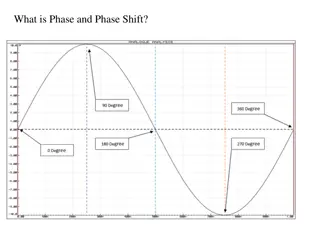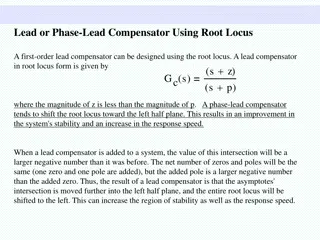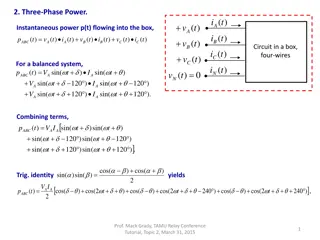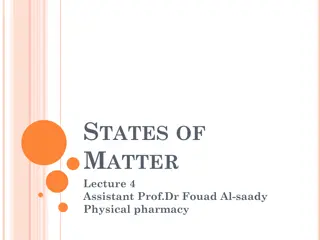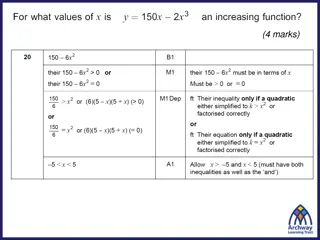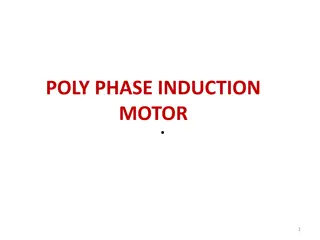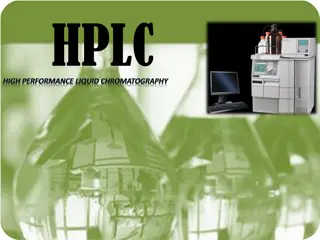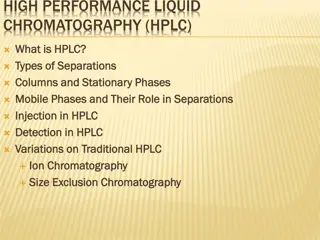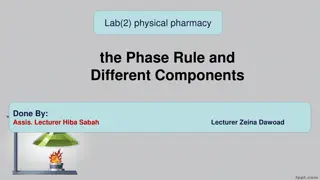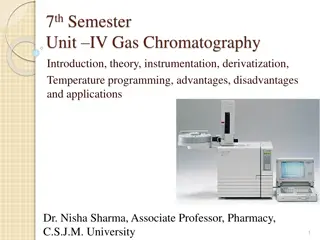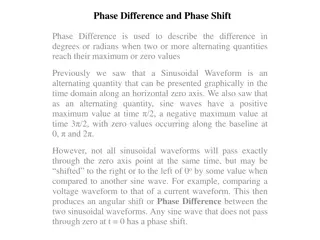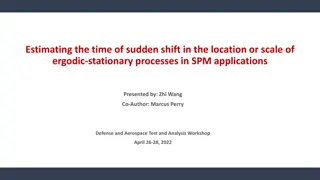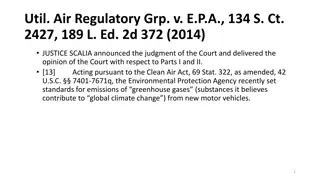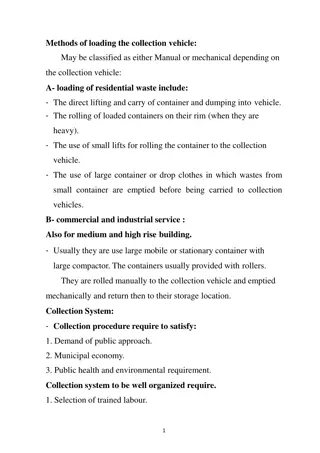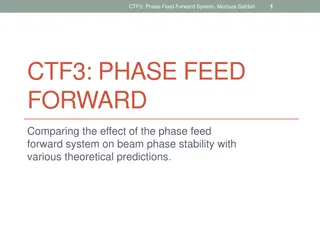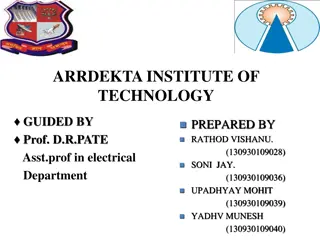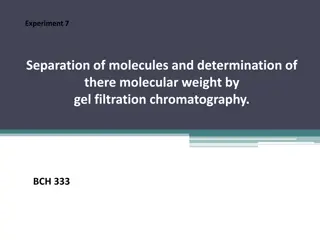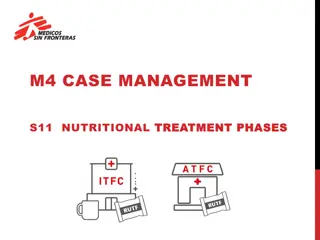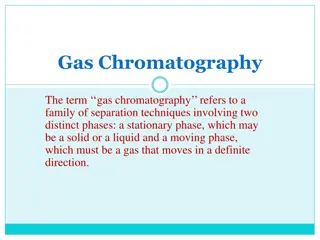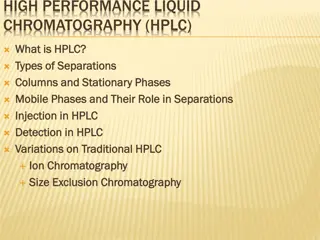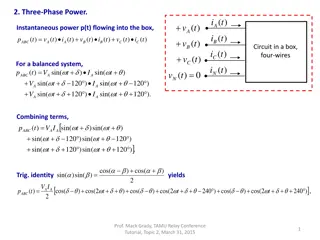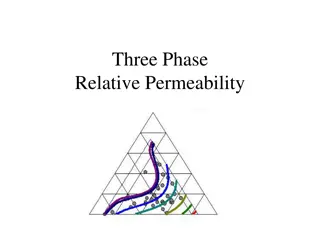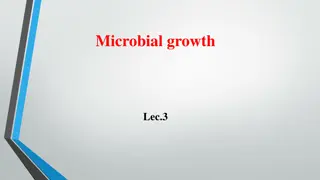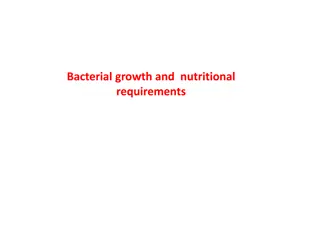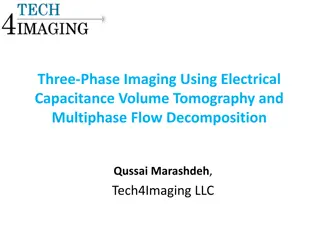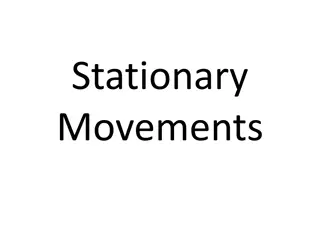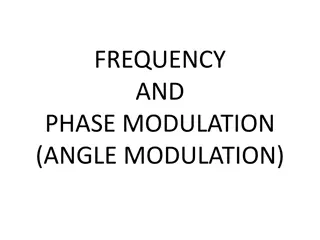RC Phase Shift Oscillators
Dive into the world of RC phase shift oscillators, exploring the concepts of phase and phase shift in electronic circuits. Learn how cascading RC networks can achieve specific phase shifts, the role of impedance, and the practical applications of RC feedback networks in oscillator circuits. Discover
3 views • 18 slides
Lead and Phase-Lead Compensators
Lead and Phase-Lead compensators play a crucial role in improving system stability and response speed. By using the root locus and frequency response methods, these compensators shift the root locus toward the left half-plane, adding positive phase over the frequency range. This leads to increased s
2 views • 16 slides
Three Stages of Project Life Cycle
The project life cycle consists of three key stages: pre-investment phase, construction phase, and normalisation phase. The pre-investment phase involves objective formulation, demand forecasting, and cost-benefit analysis. The construction phase focuses on building project infrastructure and invest
2 views • 5 slides
Three-Phase Power Systems and Instantaneous Power Flow
This detailed content delves into three-phase power systems, analyzing instantaneous power flow, balanced circuits, and trigonometric calculations. It explores the concept of constant three-phase power and provides insights into the analogy of a piston engine with infinite cylinders. The data includ
4 views • 9 slides
Phase Equilibria in Physical Pharmacy
Delve into the complexities of states of matter, phase equilibria, and the phase rule as explained by Assistant Prof. Dr. Fouad Al-saady in the context of physical pharmacy. Learn about phase definitions, phases in different systems, and examples illustrating phase differentiation in various substan
1 views • 22 slides
Points of Inflection in Calculus
Points of inflection in calculus refer to points where the curve changes from convex to concave or vice versa. These points are identified by observing changes in the curve's concavity, and they are not always stationary points. A stationary point can be a point of inflection, but not all points of
0 views • 14 slides
Phase 1 Phonics: Developing Early Listening and Speaking Skills
Phase 1 Phonics, the initial stage of Letters and Sounds, focuses on enhancing children's speaking and listening abilities to prepare them for phonics work in Phase 2. This phase emphasizes tuning in to sounds, listening and remembering sounds, and talking about sounds through various activities des
4 views • 17 slides
Poly Phase Induction Motor Construction
An induction motor is comprised of a stator and rotor, with the stator featuring a 3-phase winding fed from a 3-phase supply. The rotor comes in two types - squirrel-cage and phase wound. The squirrel-cage rotor consists of heavy bars tightly pressed on the shaft, while the phase wound rotor has a 3
2 views • 47 slides
HPLC: A Powerful Liquid Chromatography Technique
High-performance liquid chromatography (HPLC) is a powerful tool in analysis, offering high performance and speed compared to traditional chromatography methods. It involves separating components through a stationary phase and mobile phase, utilizing adsorption principles for separation. HPLC is wid
8 views • 58 slides
An Overview of High Performance Liquid Chromatography (HPLC)
High Performance Liquid Chromatography (HPLC) is a powerful analytical technique used for separating and identifying compounds in a mixture. It involves a mobile phase and a stationary phase to achieve separation based on different physicochemical properties. The mobile phase plays a crucial role in
1 views • 20 slides
The Phase Rule in Physical Pharmacy: Two Component Systems and Equilibrium Phases
The Phase Rule is essential in determining the state of a system based on components and phases. This study explores two-component systems in physical pharmacy, illustrating miscibility behaviors and equilibrium phases through diagrams and explanations. Understanding binodal curves, tie lines, and t
1 views • 12 slides
Gas Chromatography: Introduction, Theory, Instrumentation, Derivatization
Gas chromatography is a powerful analytical technique used for separating and analyzing volatile compounds. It involves a mobile gas phase passing through a stationary phase, with components in the mixture interacting differently, resulting in separation. The technique dates back to 1905 and has evo
0 views • 12 slides
Phase Difference and Phase Shift in Sinusoidal Waveforms
Phase difference and phase shift describe the angular displacement of sinusoidal waveforms in degrees or radians. These concepts are crucial in analyzing the relationship between alternating quantities such as voltage and current. The phase angle determines the shift of a waveform along the horizont
3 views • 26 slides
Estimating Time of Sudden Shift in Ergodic-Stationary Processes for SPM Applications
Industrial processes now require advanced data analysis techniques due to high-rate data sampling and non-normal distributions. Existing change point estimation methods have limitations, especially with autocorrelation. This study focuses on estimating the time of sudden shifts in ergodic-stationary
1 views • 11 slides
Training Phase in Teen Challenge Residential Program
The training phase in the Teen Challenge residential program is a crucial period focused on developing drug-free lifestyles, deepening relationships with Jesus, and creating personal recovery and exit plans. Participants follow a structured daily schedule that includes devotions, classes, work progr
1 views • 12 slides
EPA Regulations and Clean Air Act: Legal Interpretation
The case of Util. Air Regulatory Grp. v. E.P.A. (2014) addresses whether the EPA's regulations on motor-vehicle greenhouse gas emissions trigger permitting requirements for stationary sources under the Clean Air Act. It delves into the provisions of the Act concerning both stationary and moving sour
0 views • 79 slides
Waste Collection Systems Overview and Best Practices
Waste collection systems can be classified as manual or mechanical based on the type of collection vehicle used. Residential waste loading methods include direct lifting, rolling of containers, and use of lifts. Commercial and industrial services typically utilize large mobile or stationary containe
2 views • 7 slides
Phase Feed Forward System: Analyzing Beam Phase Stability and Theoretical Predictions
Exploring the impact of phase feed forward systems on beam phase stability through comparisons with theoretical predictions and simulations of increasing limitations. Testing the accuracy of theoretical gain factors and assessing performance using global gain factors. Utilizing specific data files a
1 views • 58 slides
Three Phase Transformers and Connections in Power Systems
Exploring the fundamentals of three-phase transformers and their connections in power systems, such as star-star, delta-delta, star-delta, and delta-star. Learn about advantages, disadvantages, and applications of these configurations in balanced and unbalanced loads. Discover how three single-phase
1 views • 19 slides
Weather Fronts: How They Form and Impact Weather Patterns
Weather fronts, including cold fronts, warm fronts, stationary fronts, and occluded fronts, play a crucial role in influencing weather patterns. Cold fronts bring quick storms with heavy rain and thunder, while warm fronts lead to gentle rain followed by milder weather. Stationary fronts result in p
1 views • 17 slides
Chromatography: A Practical Experiment
Chromatography is a process used to separate components of a mixture by employing a mobile phase that carries the mixture through a stationary phase. This experiment by Mariam Nimri explores the effects of different solvents on chromatography results, with a hypothesis that vinegar can impact pigmen
1 views • 10 slides
Gel Filtration Chromatography: Separation and Molecular Weight Determination
Gel filtration chromatography is a method used for separating proteins based on their molecular weights. This experiment aims to teach students the principles of gel filtration chromatography and provide hands-on experience in the lab. By utilizing a stationary phase of porous beads and a mobile pha
0 views • 22 slides
Numerical Methods for Root Finding and Iteration
Explore the concepts of root finding, locating roots, stationary points, and iteration in numerical methods. Learn to determine roots, stationary points, and convergence/divergence types, as well as apply the Newton-Raphson method for function approximation.
0 views • 17 slides
Nutritional Treatment Phases in Pediatric Malnutrition
This session covers the different phases of nutritional treatment in pediatric malnutrition programs, focusing on objectives, specifics, and criteria for transitioning between phases. An illustrative case of Annika, a 3-year-old in the Transition Phase, is provided for practical application and unde
1 views • 5 slides
Gas Chromatography: Principles, Applications, and Strengths
Gas chromatography is a separation technique involving a stationary phase and a gas mobile phase. The principles involve flowing a gaseous mobile phase through a column for separation based on component interactions. While its use in drug analysis has declined with the advent of HPLC, GC is still va
2 views • 22 slides
High Performance Liquid Chromatography (HPLC)
High Performance Liquid Chromatography (HPLC) is a powerful analytical technique used for separating compounds in a liquid mixture based on their interactions with the stationary phase and mobile phase. It involves different types of separations, columns, mobile phases, and detection methods. Isocra
0 views • 20 slides
Three-Phase Power Systems
This content discusses three-phase power systems, including instantaneous power flow, balanced systems, and trigonometric identities. It delves into the concept of smooth running machines in relation to three-phase power, analyzing the constant nature of instantaneous power. The analogies to a pisto
1 views • 7 slides
Three-Phase Relative Permeabilities in Reservoir Engineering
Explore the application, correlations, and traditional assumptions of three-phase relative permeabilities in reservoir engineering. Learn about saturation-dependencies, occupancy models, and the challenges of measuring three-phase relative permeabilities. Discover how to calculate three-phase permea
1 views • 14 slides
Microbial Growth: Phases and Dynamics
Microbial growth is defined as an increase in cellular constituents leading to a rise in microorganism size or population. The growth of bacterial cells is characterized by distinct phases such as lag phase and exponential phase. During the lag phase, cells are synthesizing new components before div
1 views • 21 slides
Bacterial Growth and Nutritional Requirements
Bacterial growth involves processes like binary fission, exponential phase, and stationary phase. Factors influencing growth include nutrient availability, oxygen levels, and toxic waste accumulation. Lag phase precedes exponential growth, where cells prepare for division. Stationary phase occurs wh
1 views • 11 slides
Phase II Trial Design in Oncology Drug Development by Wendy R. Parulekar, MD, FRCP
This presentation covers the pivotal role of Phase II trials in oncology drug development, emphasizing the importance of preliminary clinical efficacy screening, adverse event profiling, mechanism of action understanding, and target population definition. It discusses various Phase II trial designs,
0 views • 76 slides
Advanced Imaging Techniques for Three-Phase Flows in Reactor Systems
Gas-liquid-solid reactor systems require advanced measuring techniques to understand complex three-phase flows. Multi-Phase Flow Decomposition using Electrical Capacitance Volume Tomography (ECVT) offers innovative solutions for visualizing and quantifying phase hold-up distributions and dynamic cha
0 views • 17 slides
Moving to the Design Phase: Feasibility Phase Checklist
The transition requirements for moving to the Design Phase include the Water Fund being deemed feasible, resources committed for design, and a formal decision made. The Feasibility Phase Checklist covers governance, science, finance, implementation, and communications aspects. The high-level action
0 views • 4 slides
Oral Rimegepant for Preventative Treatment of Migraines: Phase 2/3 Trial
More than 1 billion people worldwide suffer from migraines, a condition more prevalent in women. This study evaluates the efficacy, safety, and tolerability of rimegepant in preventing migraine attacks through a randomized, double-blind, placebo-controlled trial. Rimegepant targets Calcitonin Gene-R
0 views • 15 slides
THE NORMAL MENSTRUAL CYCLE
The normal menstrual cycle is essential for releasing a mature oocyte for fertilization. It consists of two main phases - the follicular phase (Days 1-14) and the luteal phase (Days 14-28), each characterized by specific ovarian and endometrial changes. During the follicular phase, a dominant follic
0 views • 5 slides
Stationary Movements
Embrace the mesmerizing world of "Stationary Movements," where art and motion converge to create captivating visuals. Discover unique perspectives and innovative techniques that redefine traditional boundaries. Immerse yourself in a dynamic exploration of the interplay between stillness and movement
0 views • 15 slides
Angle Modulation: Frequency and Phase Variations
Angle modulation involves varying the frequency or phase of a carrier signal based on the modulating signal. Frequency Modulation (FM) and Phase Modulation (PM) are types of angle modulation that offer better noise discrimination. This results in improved robustness against interference but comes at
0 views • 23 slides
DIFFRACTION AND INTERFERENCE
Delve into the phenomena of wave interference, diffraction, and the formation of stationary waves. Discover the principles of superposition and the creation of interference fringes using laser sources. Unveil the intriguing concept of path difference and coherence, along with the applications in spe
0 views • 40 slides
Non-Stationary Reactor Xenon Poisoning When Shedding Load to Zero
In a non-stationary reactor scenario, xenon poisoning becomes a critical issue when shedding load to zero. Such conditions cause the formation of an iodine pit, potentially impacting reactor performance and safety. Understanding and managing xenon and iodine behavior during load shedding is essentia
0 views • 82 slides
Welcome to phonics with parents.
In phonics learning, children start in Nursery and the Early Years Foundation Stage (EYFS), utilizing this knowledge for reading and writing. Through active and engaging 20-minute daily lessons, children recap and learn new sounds, enhancing their decoding skills and reading confidence. The approach
0 views • 29 slides
